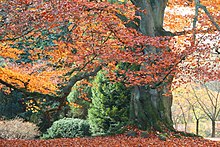
Back Ашә (аҵиаа) Abkhazian Fagus AN زان Arabic زان (جنس من النباتات) ARZ Fagus AST Fıstıq Azerbaijani فیستیق AZB Бук Bashkir Бук Byelorussian Бук Bulgarian
| Beech | |
|---|---|

| |
| European beech (Fagus sylvatica) | |
| Scientific classification | |
| Kingdom: | Plantae |
| Clade: | Tracheophytes |
| Clade: | Angiosperms |
| Clade: | Eudicots |
| Clade: | Rosids |
| Order: | Fagales |
| Family: | Fagaceae |
| Subfamily: | Fagoideae K.Koch |
| Genus: | Fagus L. |
| Type species | |
| Fagus sylvatica | |
| Species | |
|
See text | |
Beech (Fagus) is a genus of deciduous trees in the family Fagaceae, native to subtropical (accessory forest element) and temperate (as dominant element of mesophytic forests) Eurasia and North America. There are 14 accepted species in two distinct subgenera, Englerianae Denk & G.W.Grimm and Fagus.[1] The subgenus Englerianae is found only in East Asia, distinctive for its low branches, often made up of several major trunks with yellowish bark. The better known species of subgenus Fagus are native to Europe, western and eastern Asia and eastern North America. They are high-branching trees with tall, stout trunks and smooth silver-grey bark.
The European beech Fagus sylvatica is the most commonly cultivated species, yielding a utility timber used for furniture construction, flooring and engineering purposes, in plywood, and household items. The timber can be used to build homes. Beechwood makes excellent firewood. Slats of washed beech wood are spread around the bottom of fermentation tanks for Budweiser beer. Beech logs are burned to dry the malt used in some German smoked beers. Beech is also used to smoke Westphalian ham, andouille sausage, and some cheeses.
- ^ Denk, Thomas; Grimm, Guido W.; Cardoni, Simone; Csilléry, Katalin; Kurz, Mirjam; Schulze, Ernst-Detlef; Simeone, Marco Cosimo; Worth, James R. P. (2024). "A subgeneric classification of Fagus (Fagaceae) and revised taxonomy of western Eurasian beeches". Willdenowia. 54 (2–3). doi:10.3372/wi.54.54301. ISSN 0511-9618.